More than 500 arrested in Bangladesh capital over violence: police
More than 500 people, including some opposition leaders, have been arrested over days of clashes in the Bangladesh capital Dhaka sparked by protests against job quotas, police said Monday.
“At least 532 people have been arrested over the violence,” Dhaka Metropolitan Police spokesman Faruk Hossain told AFP.
“They include some BNP leaders,” he added, referring to the opposition Bangladesh National Party.
The detainees included the BNP’s third-most senior leader Amir Khosru Mahmud Chowdhury and its spokesman Ruhul Kabir Rizvi Ahmed, he said.
A former national football captain turned senior BNP figure, Aminul Huq, was also held, he added.
Mia Golam Parwar, the general secretary of the country’s largest Islamist party, Jamaat-e-Islami, was also arrested, Hossain said.
He said at least three policemen had been killed during the unrest in the capital and about 1,000 injured, at least 60 of them critically.
BNP spokesman A.K.M Wahiduzzaman told AFP that nationwide, “several hundred BNP leaders and activists were arrested in the past few days”.
Diplomats confront Bangladesh FM over violence
Diplomats in Dhaka questioned Bangladeshi authorities’ deadly response to widespread student protests following a presentation by the foreign minister that laid the blame for recent violence at demonstrators’ feet, diplomatic officials said Monday.
What began as a movement against politicised admission quotas for sought-after government jobs has snowballed into some of the worst unrest of Prime Minister Sheikh Hasina’s tenure, with at least 163 people killed in clashes so far, according to an AFP count of victims reported by police and hospitals.
Foreign Minister Hasan Mahmud summoned ambassadors for a briefing Sunday and showed them a 15-minute video that sources said focused on damage caused by protesters.
But a senior diplomatic official in Dhaka, speaking on condition of anonymity, told AFP on Monday that US ambassador Peter Haas said Mahmud was presenting a one-sided version of events.
“I am surprised you did not show the footage of police firing at unarmed protesters,” the source quoted Haas as telling the minister.
The source added that Mahmud also did not respond to a question from a United Nations representative about the alleged use of UN-marked armoured personnel carriers and helicopters — which the country has in its military inventories — to suppress the protests.
The meeting came after Bangladesh’s top court pared back the hiring quotas for highly desirable government jobs that have been at the centre of the protests.
The decision curtailed the number of reserved jobs from 56 percent of all positions to seven percent, most of which will still be set aside for the children and grandchildren of “freedom fighters” from Bangladesh’s 1971 liberation war against Pakistan.
While the decision represented a substantial reduction to the contentious “freedom fighter” category, it fell short of protesters’ demands to scrap it altogether.
Critics say the quota has been used to stack public jobs with loyalists to Hasina’s ruling Awami League.
A spokesman for Students Against Discrimination, the main group organising the demonstrations, told AFP: “We won’t call off our protests until the government issues an order reflecting our demands.”
Hasina, 76, has ruled the country since 2009 and won her fourth consecutive election in January after a vote without genuine opposition.
Since the crackdown on protests began, some demonstrators have said they will not be satisfied until Hasina’s government steps down.

DHAKA: Bangladesh’s Supreme Court on Sunday scrapped most quotas on government jobs after nationwide action led by students spiralled into clashes that killed at least 139 people, but some organisers said the protests would continue.
Dismissing a lower court order, the Supreme Court’s appellate division directed that 93pc of government jobs should be open to candidates on merit, Attorney General A.M. Amin Uddin said.
A Bangladeshi student group whose demonstrations against civil service hiring rules precipitated serious nationwide unrest said on Sunday it would not abandon protests despite the SC ruling partially meeting their demands.
“We won’t call off our protests until the government issues an order reflecting our demands,” a spokesman for Students Against Discrimination told AFP, on condition of anonymity.
Student groups say ruling is unclear; Dhaka remains under ‘indefinite’ curfew
There was no immediate reaction from groups affected by reduced quotas following Sunday’s verdict.
The recent clashes followed similar violent protests ahead of January’s national elections by Sheikh Hasina’s opponents in response to what they called her authoritarian rule, and by garment workers demanding better pay amid high inflation.
The AG insisted that students had clearly said they were in “no way part of the violence and arson”. “I am hoping normalcy will return after today’s ruling and people with ulterior motives will stop instigating people,” he added.
Internet and text message services in Bangladesh have been suspended since Thursday, as security forces cracked down on protesters who defied a ban on public gatherings.
On Sunday, India said over 4,500 students returned home over the past few days. It said 500 Nepalese students and 38 from Bhutan also had arrived in the country.
Protests to continue
At least four protest coordinators told BBC Bangla that they planned to continue their action until they secured the release of some detained student leaders and the restoration of internet and other cellular services.
“The judgement of the Supreme Court seems unclear to us. There is no clear-cut solution for all types of quotas,” said Abdul Quader, one of the coordinators.
Soldiers have been patrolling the streets of Dhaka since the government ordered a curfew late on Friday. A tank was stationed outside the SC gates at the time of the hearing as Dhaka remains under ‘indefinite’ curfew .
At least 139 people have been killed so far, according to data from hospitals. Universities and colleges have been closed since Wednesday.
Published in Dawn, July 22nd, 2024
After nearly a week of violent student protests against government job-quotas for former freedom fighters and their descendents across Bangladesh, more than 130 people have been killed. The Bangladeshi government has cracked down harshly on the protests with police and other security forces including the country’s military being deployed to quell unruly mobs in urban areas of Bangladesh.
The action by the security forces included enforcing a curfew, suspending internet and other communication services and deployment of special forces against protestors blocking government buildings, including the state owned TV station Bangladesh TV.
According to a July 20 Bangladesh Police statement, 150 policemen were wounded while quelling the protests and were hospitalised. The military was also deployed in numbers to assist in combatting the protests as widespread violence devolved into anarchy, looting and riots across the country.
Likely in an attempt to assuage the public outcry, the appellate division of the Supreme Court of Bangladesh has now nullified a judgement by the High Court which restored a controversial measure for affirmative action in the country’s public sector. The measure to reserve over 30% of government jobs for relatives of freedom fighters who fought in Bangladesh’s 1971 liberation war that separated it from Pakistan has now been lowered to only 5%.
Under the Supreme Court’s July 21 judgement, a further 2% of the jobs will also be reserved for ethnic and religious minorities but the remaining 93% will be recruited based simply on merit.
The protestors in their slogans during the protests have singled out the Prime Minister of Bangladesh, Sheikh Hasina, and are characterising her as an autocrat. The protestors have also endorsed Islamist extremist ideas in their slogans and rhetoric.
Hasina is the daughter of Bangladesh’s first Prime Minister and liberation war leader Mujibur Rehman and has inherited her father’s anti-Islamist and extremist political legacy. While Bangladesh’s neighbours and security partners India and China have not intervened militarily they both have stakes in the preservation of the Sheikh Hasina government as she has opened avenues of cooperation with both countries.
In doing so, she has been successful in balancing relations with both despite the rivalry between India and China, which has in turn led to investment by both New Delhi and Beijing in Dhaka’s economy and infrastructure.
Earlier in May 2024, Hasina had alleged that a foreign country was conspiring to carve out a new Christian state from parts of Bangladesh, Myanmar and other nearby countries. She also alleged that she was offered a path to reelection without opposition in future elections if she cooperated with the plot.
Amid the good news, the Hasina government received a jolt from Bengal chief minister Mamata Banerjee, who rued the deaths of students in Bangladesh and offered shelter to those in distress
Devadeep Purohit
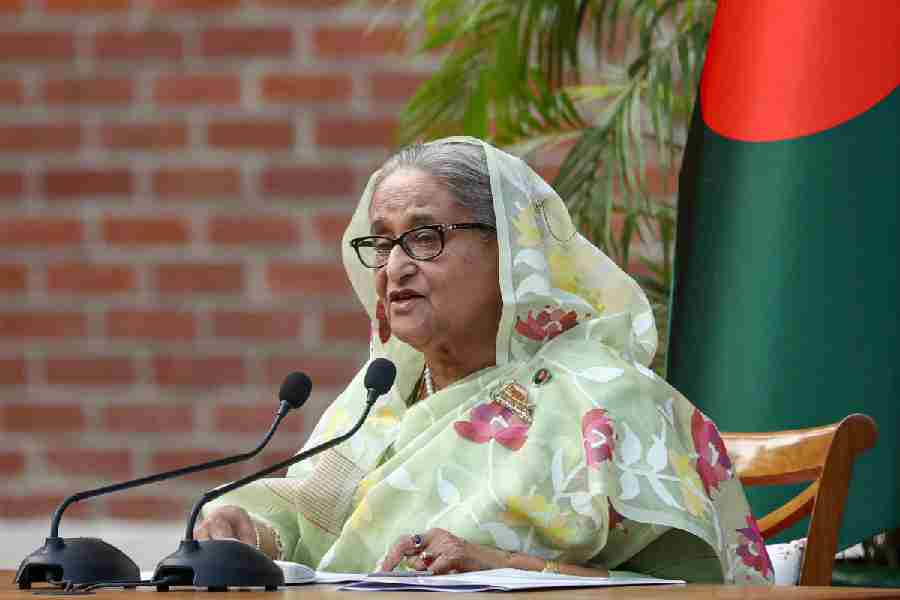
Sheikh Hasina.File Photo.
The Supreme Court of Bangladesh on Sunday cut the job reservation for muktijodhhas’ kin to 5 per cent from 30, gladdening the embattled Sheikh Hasina government after days of tumultuous anti-quota protests that witnessed at least 127 deaths.
The appellate division of the court made merit the sole consideration for recruitment to 93 per cent of government jobs, while setting aside 2 per cent for ethnic minorities, transgenders and the disabled.
The government had appealed against a June 5 high court order that reinstated the 30 per cent quota for the relatives of 1971 war heroes after the Hasina government had scrapped it in 2018.
The high court verdict had triggered protests by students — who wanted the quota abolished or heavily truncated — which quickly snowballed into nationwide unrest with the Opposition Jamaat-e-Islami and the BNP wading in.
Shaken by the violence, which pushed the country to the brink of a political crisis, the government had moved the appeal on July 10.
“The Supreme Court said the high court verdict was illegal,” attorney-general Aminuddin Manik told the media on a day of relative calm.
Till late evening, there were no reports of any more deaths in clashes.
“Except for some parts in Dhaka, Narayanganj, Narsingdi and Gazipur, the situation is approaching normality in most places in the country. We expect things to be much better from tomorrow,” a source in Bangladesh said.
Amid the good news, the Hasina government received a jolt from Bengal chief minister Mamata Banerjee, who rued the deaths of students in Bangladesh and offered shelter to those in distress. The comment did not go down well with the Bangladesh government, multiple sources in Dhaka said.
Law minister Anisul Huq told the Bangladeshi media that the government welcomed the “prudent verdict” and would issue a notification on this “immediately”.
There was, however, no clarity on whether the apparent calm would last. Reports said the BNP and Jamaat were planning a bigger offensive.
In a Facebook post, BNP acting chairperson Tareq Rahman, exiled in London, urged people to unite for a “bigger movement” to bring down the Hasina government.
What the students would do next too remained shrouded in confusion amid reports of a divide among them.
BBC Bangla said some student leaders wanted the protests to continue till the government had met the other demands, such as an apology from the Prime Minister, resignation of certain senior ministers, restoration of phone lines and Internet services, and the resumption of classes on the campuses.
“The genuine students should be happy with the verdict as their demand has been met.... They have some other demands like the withdrawal of cases against students and compensation for the families of the dead,” a highly placed source in the Hasina administration said.
The source said the discussions on these demands would begin on Sunday evening or Monday morning.
“The time has come to differentiate the students from the troublemakers who want to destabilise the country. Those still pursuing violence will be dealt with strongly,” the source said.
The source skirted a question about the death toll — Bangladeshi and foreign media outlets have suggested a conservative figure of 127 — saying the numbers are yet to be collated by the government.
A senior journalist with a leading English-language newspaper, however, told this correspondent that the death count could be “between 300 and 400” as the scale of the violence was “unprecedented”.
Referring to the last few days’ violence, the journalist criticised the high-handed approach of the armed forces and the ruling Awami League’s student wing.
But the journalist, often critical of the Hasina government in the past, endorsed the government narrative and blamed the Opposition, especially Jamaat, for the crisis.
“Jamaat and its student wing had not been so active in any movement in recent memory.... They spent a lot of money, too. I’m clueless about the source of their funding,” the journalist said.
The government swung into action to counter the “misinformation campaign” that had tarnished the country’s image and brought Hasina’s role in the alleged carnage under the scanner.
In the afternoon, the government circulated a detailed list of “subversive activities”, such as vandal attacks on Mujibur Rahman’s mural in Chittagong, and arson at Bangladesh Television, Metro stations in Dhaka and scores of government offices across the country.
“Irreparable damage has been done to public properties. Do you think the students would have done such a thing?” a source in Hasina’s office said.
“After the first few days, the BNP and the Jamaat hijacked the movement. As they engaged in arson, vandalised public properties and killed innocent people, the students distanced themselves from these activities, even issuing statements to this effect.”
Bangladesh foreign minister Hasan Mahmud held a briefing for foreign mission heads in Dhaka to explain the government’s stand on the protesters’ demands and its deployment of the armed forces.
“Our PM had been sympathetic towards the student’s main demand from Day One.... The BGB (Border Guard Bangladesh) and the police were told specifically to use non-lethal means to contain the student movement till the vandals began attacking the law enforces,” another source said.
“The deployment of the army was only to help the civil administration save lives, and was made only in vulnerable areas.”
The source insisted that the forces didn’t fire a single bullet at the students.
Amid reports that a section of the armed forces was unhappy at the decision to deploy them against the students, the government released pictures of Hasina meeting top officers of the army, navy and the air force and other senior security establishment officials.
“Everything is under control. She also met senior ministers and party leaders today,” a source in the PMO said.
Editorial
Students have been at the forefront of the protests. Many young people took to the streets after a court reinstated quotas for the children and grandchildren of ‘freedom fighters’ — those who participated in the creation of Bangladesh in 1971 — in government jobs. Public sector employment is a popular option for many in Bangladesh, yet nearly half the jobs are reserved under various quotas. With the economy stagnating and millions of Bangladeshis out of work, the court decision has unleashed much pent-up anger. The situation remained tense on Friday, with sporadic protests reported from the country.
The demonstrations over job quotas cannot be seen in isolation, as an economic slowdown, as well as a sense of political disenfranchisement, has created an explosive situation in Bangladesh. Prime Minister Shaikh Hasina Wajed secured a record fourth term in elections held earlier this year. Boycotted by the opposition, they had raised questions of legitimacy. Earlier, Shaikh Hasina had overseen a crackdown against opposition forces, including the Bangladesh Nationalist Party.
In such a politically polarised atmosphere, with economic growth not meeting the expectations of many Bangladeshis, such mass protests were only a matter of time. Thousands of garment workers had also taken to the streets last year demanding higher wages. The Bangladesh government should deal with the situation carefully lest the protests spiral out of control. The demonstrators’ legitimate demands should be met, while the deaths of protesters should be investigated in a transparent manner.
Moreover, the unfortunate events playing out in Bangladesh should serve as a warning sign for other South Asian states. Political victimisation coupled with economic stagnation and heavy-handed state reaction is a recipe for disaster. All political forces should be allowed to freely operate as per democratic norms, while the state needs to act with compassion and transparency in times of economic distress.
Published in Dawn, July 20th, 2024
Overseas telephone calls mostly failed to connect while websites of Bangladesh-based media organisations did not update and their social media handles remained inactive
Reuters
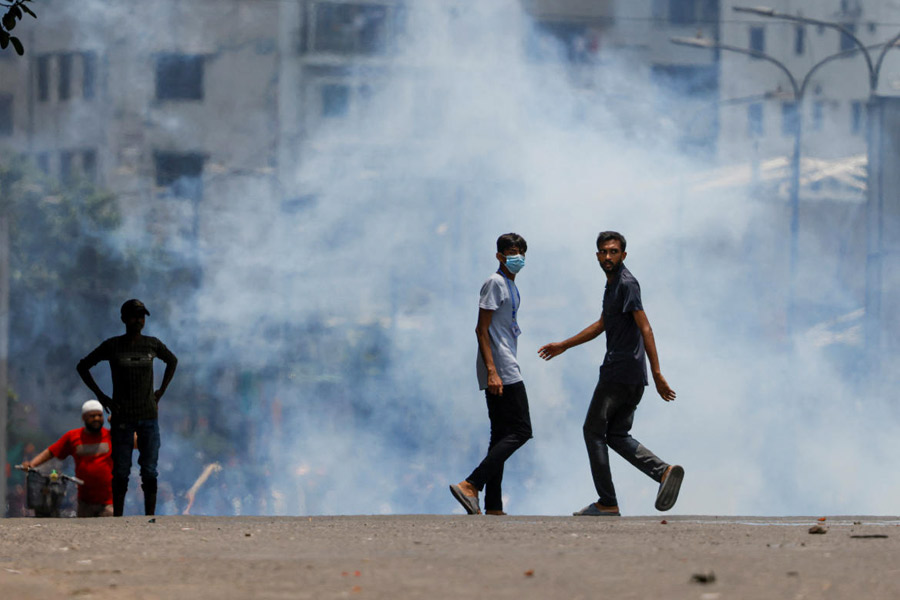
Police fire teargas during a clash between anti-quota supporters, police and Awami League supporters at the Rampura area in Dhaka, Bangladesh, July 18, 2024.Reuters
Bangladesh soldiers patrolled the deserted streets of the capital Dhaka on Saturday during a curfew meant to quell deadly students-led protests against government job quotas that have killed at least 105 people this week.
A suspension on internet and text message services has remained in place since Thursday, cutting off Bangladesh from the world as police cracked down on protests that have continued despite a ban on public gatherings.
Overseas telephone calls mostly failed to connect while websites of Bangladesh-based media organisations did not update and their social media handles remained inactive.
In addition to the deaths, the clashes have injured thousands, according to data from hospitals across Bangladesh. The Dhaka Medical College Hospital received 27 dead bodies between 5 p.m. and 7 p.m. (1100-1200 GMT) on Friday.
For five days police have fired tear gas and hurled sound grenades to scatter protesters as demonstrators clashed with security personnel, throwing bricks and igniting vehicles.
The demonstrations - the biggest since Prime Minister Sheikh Hasina was re-elected for a fourth successive term this year - have also been fuelled by high unemployment among young people, who make up nearly a fifth of the South Asian nation's 170 million people.
With the death toll climbing and police unable to contain the protests, Hasina's government imposed the national curfew and deployed the military.
The curfew was eased for two hours from noon on Saturday to allow people to shop for supplies and complete other chores, television channels reported. It will last until 10 a.m. (0400 GMT) on Sunday, when the government will assess the situation and decide the next course of action, the reports added.
Those venturing out on the streets had their identification cards inspected by army personnel at different check points, TV footage showed.
The nationwide unrest broke out over student anger against the controversial quotas for government jobs, including 30% for the families of those who fought for independence from Pakistan.
Hasina's government had scrapped the quota system in 2018, but a court reinstated it last month. The state appealed against the reinstatement and the Supreme Court suspended it for a month, pending a hearing on Aug. 7.
In the central Dhaka district of Narsingdi, protesters stormed a jail on Friday and freed over 850 inmates before setting fire to the facility, TV channels reported, citing police. Scattered incidents of arson were also reported on Saturday.
Hasina dropped plans to leave on Sunday for visits to Spain and Brazil due to the protests, the AFP news agency reported citing her press secretary.
Many opposition party leaders, activists and student protesters had been arrested, said Tarique Rahman, the exiled acting chairman of the main opposition Bangladesh Nationalist Party. Police arrested Nahid Islam, a leading coordinator of the students' agitation, at 2 a.m. on Saturday, the protesters said in a text message.
Reuters could not independently confirm the arrests.
International rights groups have criticised the internet suspension and actions of security forces. The European Union said it is deeply concerned by the violence and loss of life.
Anbarasan Ethirajan
BBC South Asia Regional Editor
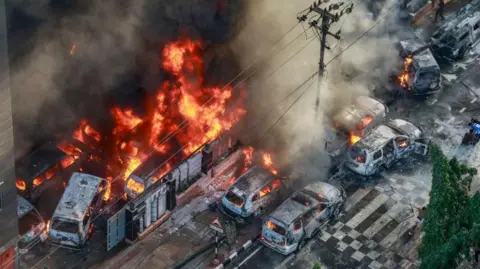
Bangladeshi students set fire to the country's state broadcaster on Thursday
Bangladesh is in turmoil.
Street protests are not new to this South Asian nation of 170 million people – but the intensity of the demonstrations of the past week has been described as the worst in living memory.
More than 100 people have died in the violence, with more than 50 people killed on Friday alone.
The government has imposed an unprecedented communications blackout, shutting down the internet and restricting phone services.
What started as peaceful protests on university campuses has now transformed into nationwide unrest.
Thousands of university students have been agitating for weeks against a quota system for government jobs.
A third of public sector jobs are reserved for the relatives of veterans from the country’s war for independence from Pakistan in 1971.
The students are arguing that the system is discriminatory, and are asking for recruitment based on merit.
Protest coordinators say police and the student wing of the governing Awami League – known as the Bangladesh Chhatra League – have been using brutal force against peaceful demonstrators, triggering widespread anger.
The government denies these allegations.
Bangladesh issues high security alert as deadly protests escalate
Bangladesh students defy ban to continue protests
“It’s not students anymore, it seems that people from all walks of life have joined the protest movement,” Dr Samina Luthfa, assistant professor of sociology in the University of Dhaka, tells the BBC.
The protests have been a long time coming. Though Bangladesh is one of the fastest growing economies in the world, experts point out that growth has not translated into jobs for university graduates.
Estimates suggest that around 18 million young Bangladeshis are looking for jobs. University graduates face higher rates of unemployment than their less-educated peers.
Bangladesh has become a powerhouse of ready-to-wear clothing exports. The country exports around $40 billion worth of clothes to the global market.
The sector employs more than four million people, many of them women. But factory jobs are not sufficient for the aspiring younger generation.
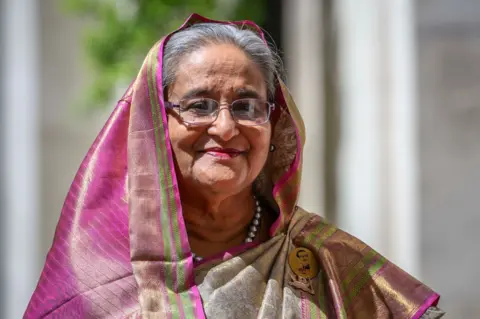
Prime Minister Sheikh Hasina has been in power for 15 years
Under Prime Minister Sheikh Hasina’s 15-year rule, Bangladesh has transformed itself by building new roads, bridges, factories and even a metro rail in the capital Dhaka.
Its per-capita income has tripled in the last decade and the World Bank estimates that more than 25 million people have been lifted out of poverty in the last 20 years.
But many say that some of that growth is only helping those close to Ms Hasina’s Awami League.
Dr Luthfa says: “We are witnessing so much corruption. Especially among those close to the ruling party. Corruption has been continuing for a long time without being punished.”
Social media in Bangladesh in recent months has been dominated by discussions about corruption allegations against some of Ms Hasina’s former top officials – including a former army chief, ex-police chief, senior tax officers and state recruitment officials.
Ms Hasina last week said she was taking action against corruption, and that it was a long-standing problem.
During the same press conference in Dhaka, she said she had taken action against a household assistant – or peon - after he allegedly amassed $34 million.
"He can't move without a helicopter. How has he earned so much money? I took action immediately after knowing this,"
She did not identify the individual.
The reaction of the Bangladeshi media was that this much money could only have been accumulated through lobbying for government contracts, corruption, or bribery.
The anti-corruption commission in Bangladesh has launched an investigation into former police chief Benazir Ahmed – once seen as a close ally of Ms Hasina – for amassing millions of dollars, allegedly through illegal means. He denies the allegations.
This news didn’t escape ordinary people in the country, who are struggling with the escalating cost of living.
In addition to corruption allegations, many rights activists point out that space for democratic activity has shrunk over the past 15 years.
“For three consecutive elections, there has been no credible free and fair polling process,” Meenakshi Ganguly, South Asia director at Human Rights Watch, told the BBC.
“[Ms Hasina] has perhaps underestimated the level of dissatisfaction people had about being denied the most basic democratic right to choose their own leader,” Ms Ganguly said.
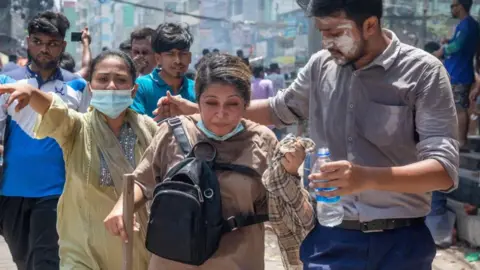
An injured woman gets help on Thursday
The main opposition Bangladesh Nationalist Party (BNP) boycotted elections in 2014 and 2024 saying free and fair elections were not possible under Ms Hasina and that they wanted the polls to be held under a neutral caretaker administration.
Ms Hasina has always rejected this demand.
Rights groups also say more than 80 people, many of them government critics, have disappeared in the past 15 years, and that their families have no information on them.
The government is accused of stifling dissent and the media, amid wider concerns that Sheikh Hasina has grown increasingly autocratic over the years. But ministers deny the charges.
“The anger against the government and the ruling party have been accumulating for a long time,” says Dr Luthfa.
“People are showing their anger now. People resort to protest if they don’t have any recourse left.”
Ms Hasina’s ministers say the government has shown extreme restraint despite what they describe as provocative actions by protesters.
They say demonstrations have been infiltrated by their political opposition and by Islamist parties, who they say initiated the violence.
Law Minister Anisul Huq said the government was open to discussing the issues.
“The government has been reaching out to the student protesters. When there is a reasonable argument, we are willing to listen,” Mr Huq told the BBC earlier this week.
The student protests are probably the biggest challenge that has faced Ms Hasina since January 2009.
How they are resolved will depend on how she handles the unrest and, most importantly, how she addresses the public's growing anger.
_Cropped.jpg)
No comments:
Post a Comment